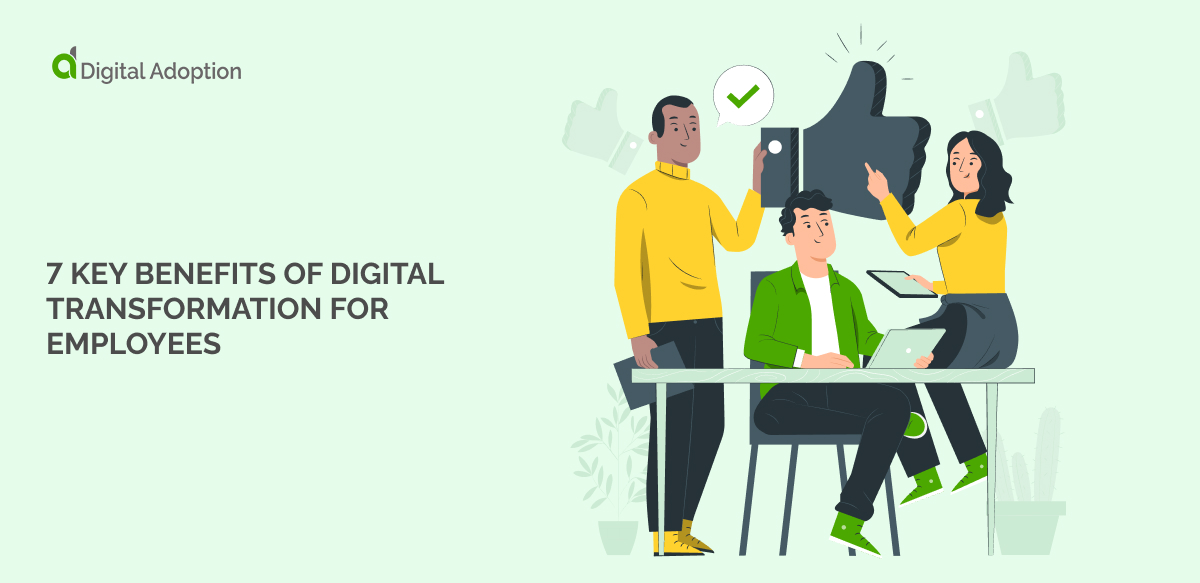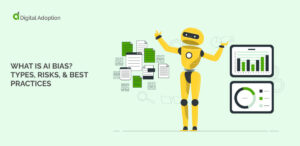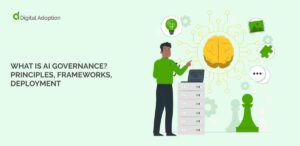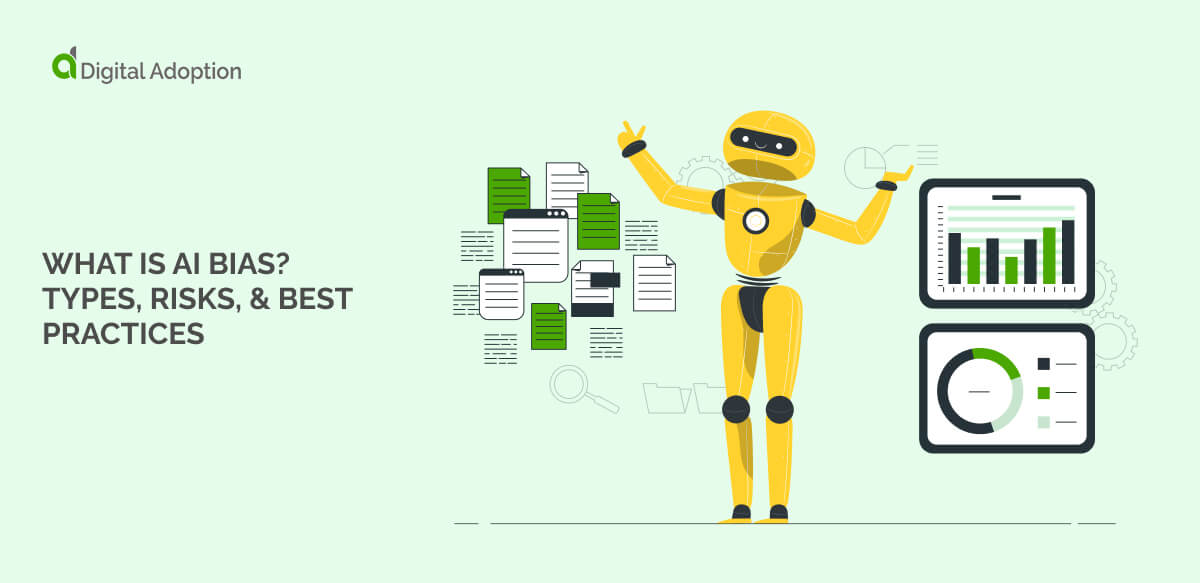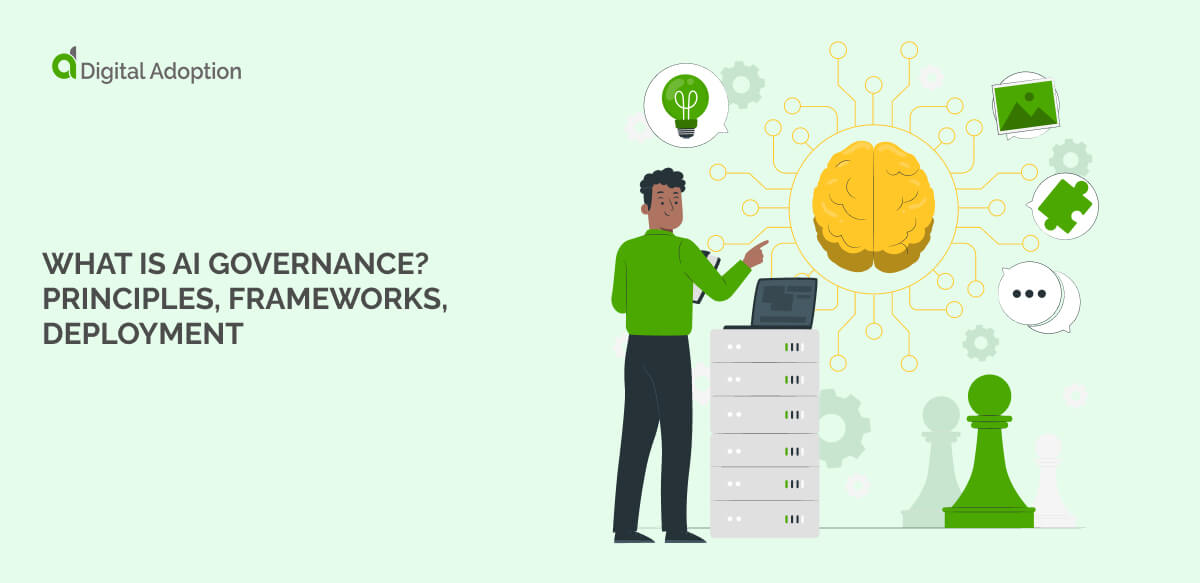Did you know that today’s college students have never licked a postal stamp?
That’s according to research done at Beloit College in Wisconsin.
As shocking as this is, it’s more than just a generation gap. The deep divide between stamp-lickers and email users proves that digital transformation has permeated virtually every facet of our lives— especially the world of work.
Your enterprise exists in and for the world; your technology needs to be up to speed if you want to attract top talent and develop capable, creative, innovative employees.
The benefits of digital transformation are well-documented, but what are the benefits of digital transformation for employees, specifically?
Well, we’ve boiled it down to this list of 7 key benefits:
- Skill development and continuous learning
- Increased flexibility and work-life balance
- Improved communication and collaboration
- Enhanced job satisfaction
- Opportunities for career advancement
- Personalized digital employee experience
- Safety and well-being
In this article, we’ll be unpacking each of these 7 key benefits in detail.
We’ll also be talking about the role employees play in your digital transformation journey and the potential challenges you may face in the near future.
The central role of employees in digital transformation
When you think of digital transformation, it’s easy to focus solely on the technology side— new software, advanced analytics, and cutting-edge solutions.
But at the heart of this transformative journey? Your employees.
Digital transformation isn’t a process you simply impose on your business. It’s a collaborative effort that requires your team members’ active involvement, insights, and skills.
Employees aren’t just passive recipients of these changes; they’re the engine driving them.
Imagine introducing a state-of-the-art software system without training or understanding your employees’ day-to-day challenges. The results would be suboptimal, to say the least.
For digital transformation initiatives to succeed, they must be rooted in the lived experiences and insights of those on the ground.
It’s your employees who interact with clients, navigate operational challenges, and bring products or services to life. They have a firsthand perspective on where inefficiencies lie and where opportunities for innovation exist.
Furthermore, as you invest in training and upskilling, you’re not only preparing your business for a digital future but empowering your employees to take charge, innovate, and play an instrumental role in shaping that future.
By placing them at the forefront, you harness their expertise, passion, and potential, making them active drivers in the journey toward a more agile, responsive, and digitally integrated enterprise.
7 key benefits of digital transformation for employees
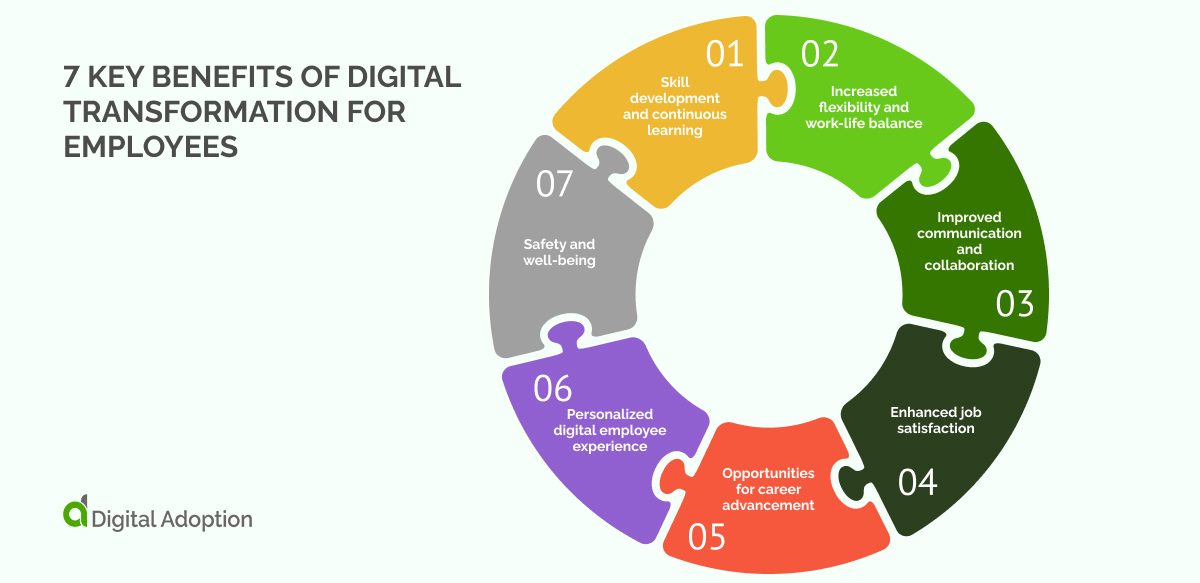
As you steer your business towards digital transformation, it’s essential to recognize its myriad benefits, not just for the organization but, importantly, for your employees.
Incorporating these benefits creates a positive work environment and signals to your employees that their growth, satisfaction, and well-being are integral to the company’s success.
We’ve already shown you the list of 7 key benefits. Now let’s unpack each one in more detail.
1. Skill development and continuous learning

Empowering your team with the latest tools and technologies doesn’t just improve business operations— it paves the way for personal growth.
Your employees will have the opportunity to enhance their digital literacy, mastering new tools that are reshaping the industry.
This continuous learning environment boosts their specialized skills, makes them more future-ready, and boosts adaptability.
2. Increased flexibility and work-life balance

The digital age has redefined where and when work happens.
With the shift towards remote work capabilities and the automation of certain processes, your employees can enjoy a better work-life balance.
They can adjust their schedules for optimal productivity or personal convenience, leading to a more satisfied and engaged workforce.
3. Improved communication and collaboration

Digital transformation introduces a suite of advanced collaboration tools that break down silos.
With streamlined communication channels, your teams can work more cohesively, fostering a unified and collaborative environment.
These tools ensure everyone stays informed, connected, and aligned toward common objectives.
4. Enhanced job satisfaction
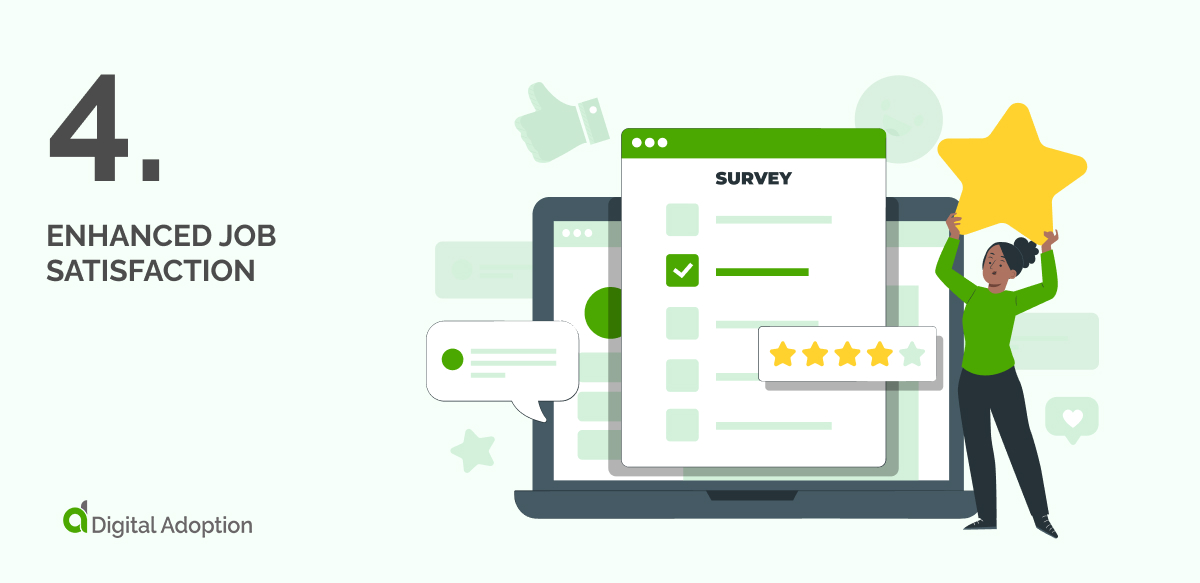
Access to real-time data and insights improves decision-making and empowers your employees, giving them a sense of control and purpose.
Moreover, by automating repetitive and mundane tasks, they can focus on more strategic, fulfilling roles, leading to increased job satisfaction.
A recent study commissioned by SalesForce revealed that employees who are dissatisfied with their workplace tech are more than twice as likely to leave their job in the next year, less than half as likely to recommend their employer, and less likely to feel productive.
5. Opportunities for career advancement

The digital era brings with it a wave of new roles and responsibilities.
As your business adopts digital initiatives, there will be an emergence of positions centered on these technologies.
This shift provides your employees with exciting growth prospects and the chance to spearhead initiatives in these burgeoning domains.
6. Personalized employee experience
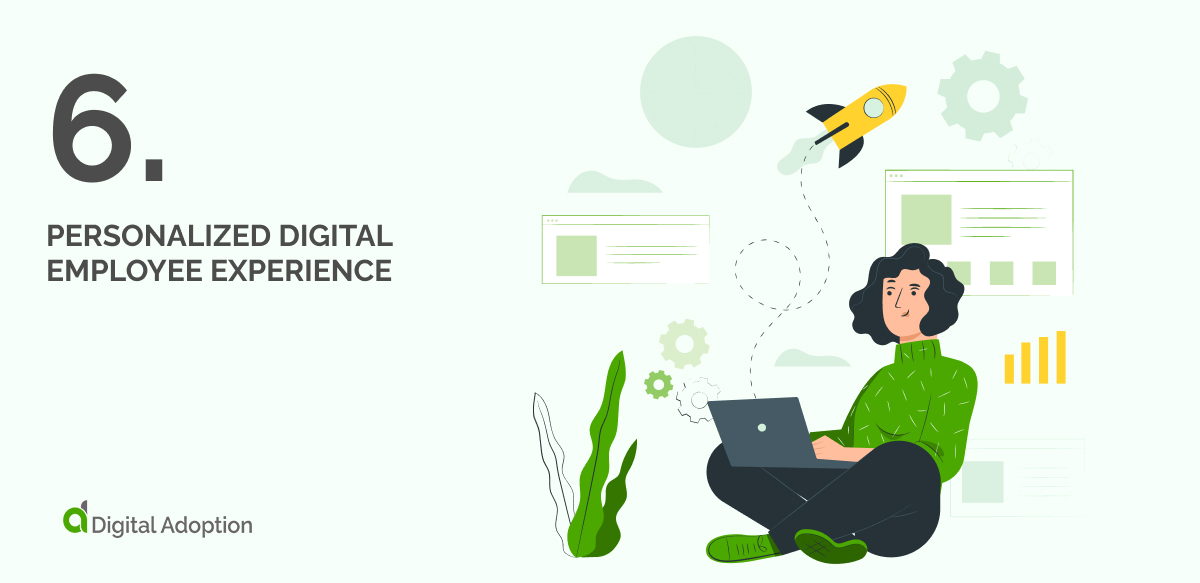
90% of CEOs stated that technology is critical to improving employee productivity and engagement in a recent Deloitte study. Why does that matter?
Because the age of one-size-fits-all is fading.
With artificial intelligence (AI) and data analytics, you can provide tailored training programs that address individual needs and learning curves.
Beyond training, personalization extends to benefits and wellness programs, ensuring that what you offer aligns with individual preferences and requirements.
7. Safety and well-being
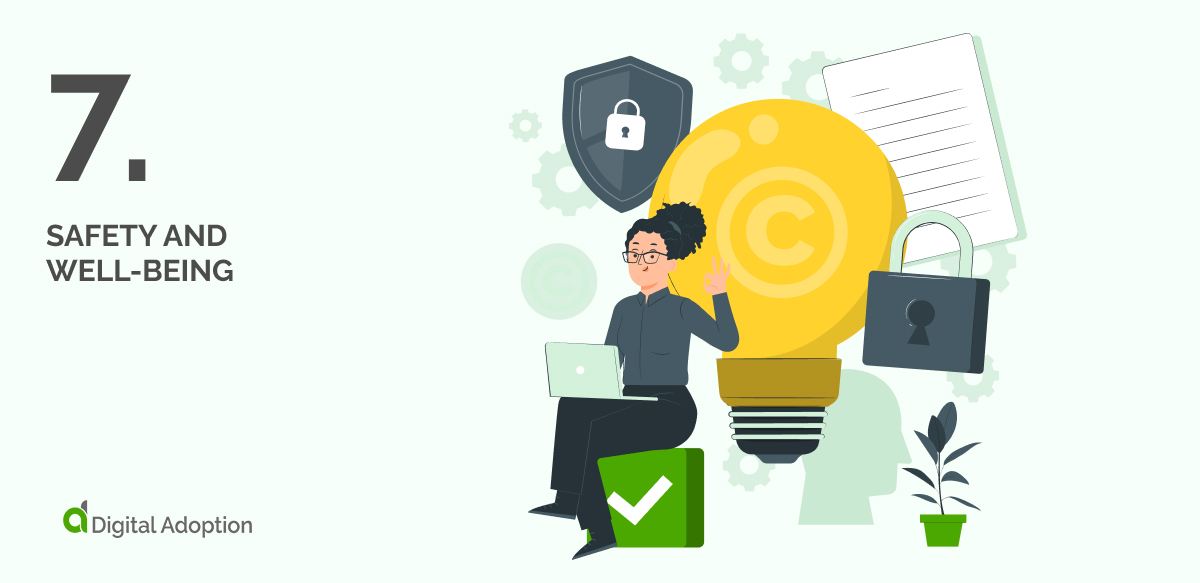
Digital tools are playing an ever-increasing role in ensuring the safety and well-being of employees.
Whether it’s technology that monitors and ensures a safe physical workspace or platforms that provide resources for mental health, digital transformation shows that you place emphasis on the holistic well-being of your team.
Overcoming potential challenges
Embracing digital transformation is undoubtedly beneficial, but like any major shift, it comes with its set of challenges.
As a forward-thinking business leader, you must recognize these hurdles and craft strategies to overcome them.
Here are some of your employees’ primary concerns about digital transformation and how you can address them.
Addressing concerns related to job displacement due to automation
The fear of machines replacing humans is a genuine concern for many employees.
While a hyperautomation platform can streamline operations, it doesn’t necessarily mean human roles become redundant.
Instead, focus on the idea that automation can complement human effort. It’s about working with technology, not being replaced by it.
Make it clear to your team that automation will handle repetitive tasks, freeing them up for more strategic, creative roles.
Engage in open dialogues, listen to their concerns, and reiterate your commitment to their professional growth in this new landscape.
The importance of continuous training and adaptability
In the digital era, the only constant is change.
Ensure that your team is equipped to handle this dynamic environment by investing in continuous training.
Regular upskilling sessions, workshops, and courses can keep them abreast of the latest technologies and trends.
Emphasize the value of adaptability and the mindset of lifelong learning. By creating a culture where adaptability is valued and supported, you help your employees stay relevant and confident in their roles, regardless of technological advancements.
Balancing digital and human touchpoints
In our rush toward digitization, it’s crucial not to lose the human element.
While digital tools offer efficiency, personal interactions hold emotional value.
Ensure that your digital transformation strategy doesn’t overlook the importance of human touchpoints. For instance, while chatbots can handle basic customer inquiries, a human might better address complex or sensitive issues.
Foster a culture where technology enhances human interactions rather than replacing them. Encourage teams to use digital tools as a means to facilitate, not eliminate, personal connections.
The future of work: Digital transformation as an enabler
As we cast our eyes to the horizon, it’s evident that the future of work will be significantly molded by digital transformation.
But what exactly will this future look like, and how do your employees fit into this evolving tapestry?
Driven by technology, the workplace of the future promises to be more flexible, interconnected, and data-driven.
Offices might shift from being fixed physical locations to hybrid office spaces, where physical presence blends seamlessly with virtual collaboration.
Advanced technologies like augmented reality and virtual reality may redefine training sessions, team meetings, and client interactions, making them more immersive and interactive.
AI-driven insights will lead to proactive decision-making, with predictive analytics helping businesses anticipate market shifts and customer needs.
Moreover, the boundaries between different job roles might blur as interdisciplinary knowledge and cross-functional collaboration become more crucial. The emphasis will shift from isolated tasks to holistic projects, focusing on innovation and value creation.
In this rapidly changing landscape, employees won’t just be passive participants. They’ll be the architects.
While technology provides the tools, it’s your employees who will wield them, leveraging their expertise and insights to drive innovation.
Their feedback on digital tools, from ease of use to potential improvements, will be invaluable in refining and optimizing these technologies. As they adapt and grow with these tools, they’ll identify new applications, processes, and solutions that technologists alone might overlook.
Moreover, as businesses become more data-driven, the human touch will be essential to provide context, ethics, and interpretation of these insights. Employees will ensure your enterprise remains grounded, ethical, and focused on genuine value creation.
In essence, while digital transformation is the vehicle propelling us into the future, it’s your employees who are at the wheel, steering with expertise, creativity, and human judgment.
Recognizing and nurturing their pivotal role ensures that the future of work is not just technologically advanced but also meaningful, inclusive, and value-driven.

